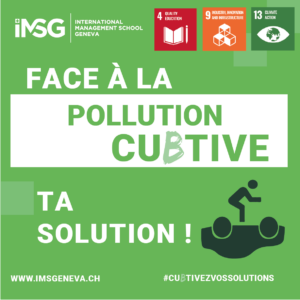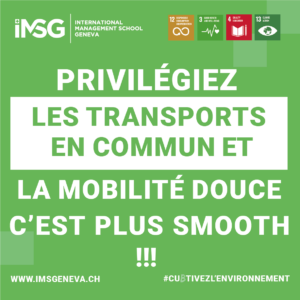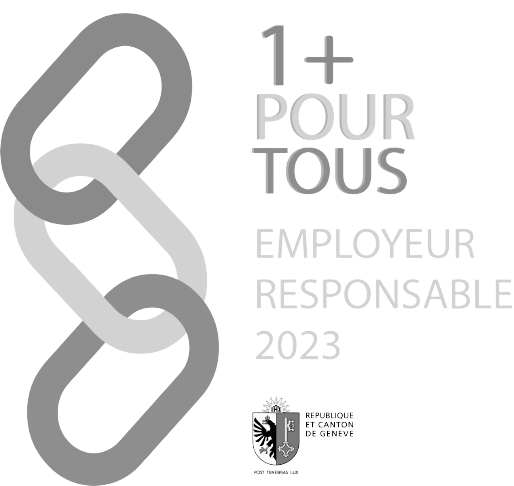
This post is also available in: FR (FR)
Global warming of the planet has become a major concern. Every organization now has a role to play in protecting the environment, and many young talents now make it a point of honor to join companies that consider protecting the environment to be one of their priorities. Thus, the IMSG has drawn up an ecological charter for its students and employees in order to reduce, as much as possible, its ecological footprint.

1) Save paper
As ADEME points out, digital technology has not reduced paper consumption when it now accounts for 75% of office waste. The study carried out shows that 25% of documents are thrown away 5 minutes after they are printed and that 16% of impressions are never read. The IMSG has therefore set itself the following objectives:
- Reduction of paper communication by using digital technology.
- Choice of a suitable grammage and more environmentally friendly paper (reliable ecological labels).
- Careful selection of quantities and items to print: removal of advertisements, photos, web page interface elements.
- Optimization of double-sided printing and / or multiple pages on the same sheet.

2) Selective sorting
Paper can be recycled up to 7 times. Office paper waste is often recyclable into quality paper whose characteristics are equivalent to those of paper made from virgin fibers. Recycling paper prevents the emission of 390,000 tonnes of CO2 per year, or the annual emissions of 200,000 cars.
The IMSG therefore performs rigorous sorting of its waste (paper, plastic, glass, cardboard), in administrative offices as well as in school classrooms. Garbage cans adapted to each type of waste are provided for this purpose, accompanied by sorting instructions.

3) Reduction of digital energy consumption
Digital represents 12% of global electricity consumption. If we put all the digital devices in the world on a scale, they would weigh as much as 179 million cars. Such a mass of connected products inevitably generates a significant impact for our planet. Indeed, according to the GreenIT firm, during the year 2019, the environmental footprint of global digital technology amounted to 6,800 TWh of energy consumed, 1,400 million tonnes of greenhouse gases emitted, 7.8 million m3 of fresh water used … This represents respectively 82 million electric radiators permanently on, 116 million car trips around the world, and 3.6 billion showers. It therefore becomes imperative to limit this consumption, which is why the IMSG is committed to pursuing the following missions:
- Setting IT equipment to “energy saving” mode.

- Switching off office tools after an hour of inactivity.
- Limitation of open and unused programs or tabs.
- Deactivation of the GPS, Wi-Fi, Bluetooth functions of mobile phones and tablets when not in use.
4) Collecting empty ink and toner cartridges
Even before it is created, a cartridge can be harmful to the environment. Indeed, when a laser cartridge is built, nearly 3 liters of oil will be required for the design, generating almost 4.8 kilograms of CO2 per unit. The toner powder in a 1,500-page consumable alone generates 3.2 kilograms of CO2. Even empty, a consumable continues to cause serious damage if it is simply thrown away, polluting the earth and groundwater.
For this reason, IMSG is working with Devillard, a printing solutions provider, which provides a service for the collection, recycling and remediation of used ink and toner cartridges.

5) Limiting the ecological impact of digital technology
Internet use has become essential in office activities. Despite its intangible aspect, its use generates very real environmental impacts. Among the greenhouse gas emissions generated by digital technology, 25% are due to Data Centers, 28% to infrastructures, and 47% to consumer equipment. In this area too, the IMSG is committed to reducing them as much as possible:
- Choice of recipients wisely.
- Limitation of systematic use of the “reply to all” function.
- Removing attachments from reply messages.

6) Saving lighting
The saving in lighting leads above all to a reduction in the costs of the company, its optimization can result in up to 70% less expenditure on this item. It also allows the company to reduce its ecological footprint, as electricity is produced from nuclear energy, which emits a lot of radioactive waste. In this context, the IMSG benefits from the infrastructural quality of the Biotech Campus:
- Lights automatically turn off in offices and meeting rooms after 15 minutes of inactivity.
- Automatic lighting cancellation when natural light is good.
- Recycling of dysfunctional lamps.

7) Limitation of the use of air conditioning
Air conditioning systems consume a lot of electricity and release refrigerants, which are responsible for increasing greenhouse gases. In order to respond to this problem, the Biotech Campus has set up, in all the administrative offices and classrooms of the IMSG, an intelligent air conditioning system whose start-up and shutdown are automated as needed. necessary refreshment.

8) Water saving

An organization of around 100 people consumes 2,000 to 5,000 m3 of water per year. An office worker (and therefore a student as well) consumes 10 to 30 liters per day (excluding air conditioning and catering). The Biotech Campus has thus installed water savers in the toilets, benefiting IMSG employees and students.
9) Limiting the carbon footprint associated with motorized travel
Transport is the leading emitting sector in Europe, producing nearly 30% of greenhouse gas emissions, 95% of which are attributable to road traffic. The IMSG thus limits the travel of its employees by car, whether for home-work or business trips, promoting teleworking and videoconferences as well as soft mobility. The CO2 emissions associated with transport are therefore limited, in addition to the well-being of employees, which is improved.

10) Prioritization of local production and short circuits
The import of products has a strong impact on the global emission of greenhouse gases (low traceability of the ecological footprint generated by foreign production, transport, etc.). Thus, the IMSG prioritizes collaboration with local suppliers (from Switzerland and more particularly from Geneva) in order to limit the transport of products / services. At the same time, it promotes the creation of wealth and jobs in Switzerland.














You must be logged in to post a comment.